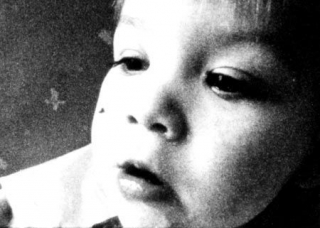Date: 1 November 2003 | Season: London Film Festival 2003 | Tags: London Film Festival
IMITATIONS OF LIFE
Saturday 1 November 2003, at 9pm
London National Film Theatre NFT3
Mike Hoolboom, Imitations of Life, Canada, 2003, 75 min
A series of topical news headlines sound like it might as well be the end of the world, but this is 1993, the year the filmmakers’ nephew was born. It’s an event that leads him to contemplate the ceaseless urge to photograph and be photographed. For Hoolboom, this compulsion indicates our discontentment with the world, which is compensated by reproducing it as ‘experience in a crisis-proof form’. Imitations of Life is a 10-part suite of dreams and memories that integrates original footage with instantly recognisable images from commercials, cinema classics and recent blockbusters. In Jack’s early years, the filmmaker sees (and shows us) the world through a child’s eyes. Later, this sense of open wonder is retained, though tempered in the knowledge that modern life doesn’t permit us such indulgence. We are ‘the children of Fritz Lang and Microsoft’, striving to give our lives shape and meaning through photographs, tv and movies. Through a vast wealth of adopted images, this video questions the values of lives lived through the lens. If movies carry our collective baggage and teach us about the world around us, do they hold us back from inventing the future?
Also Screening: Saturday 25 October 2003, at 8:30pm, London ICA2
PROGRAMME NOTES
IMITATIONS OF LIFE
Mike Hoolboom, Canada, 2003, video, colour, sound, 75 min
Expanding on the structure of Panic Bodies, with its discrete but interconnected shorts, the latest found-footage feature from Mike Hoolboom is a ten-part meditation on childhood, visual representation and the future in a world of pictures. Breathtaking in its encyclopaedic recycling and appropriation, the film moves beyond scratch video, assemblage and recontextualisation; in Hoolboom’s words it “strains childhood through a history of reproduction, culling pictures from the Lumières to the present day in order to find the future in the past.” Much more than just a poetic essay on mediation and simulation at the end of history, the film situates the ethical challenges of the future within the context of picture making, pointing to our current crisis as one of (a failure of) imagination, representation and technology.
Already acclaimed as a short in its own right, Jack works as the heart of the film, with Hoolboom’s familiar, wryly wise voice-over recounting visits with his nephew as we witness Jack growing up in processed Bolex images. Here we see possibility, for Jack makes happiness his profession and ponders if politics could ever be an expression of love.
Throughout the film, the presence of childhood, whether in pictures, voice, story, or reflection, forces us adults to rethink our responsibility, imagination, apocalyptic terrors and the formation of our own memories. The title section itself, proposes science fiction as a species of film haunted by science, obsessed with death and always about catastrophe. With visuals weaving together Riefenstahl, Terminator and many more familiar images, it leaves us with the challenge of how we will invent the future. —Ken Anderlini, Vancouver International Film Festival, 2003
Back to top
